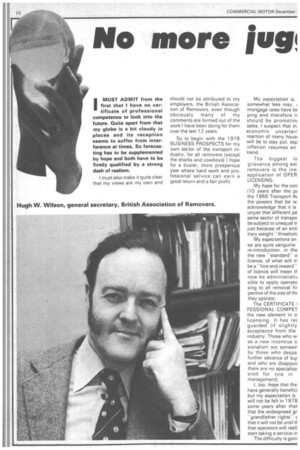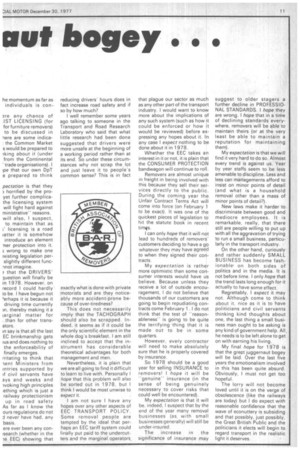No more jug
Page 12

Page 13

If you've noticed an error in this article please click here to report it so we can fix it.
Nut bogey IMUST ADMIT from the first that I have no certificate of professional competence to look into the future. Quite apart from that my globe is a bit cloudy in places and its reception seems to suffer from interference at times. So forecasting has to be supplemented by hope and both have to be firmly qualified by a strong dash of realism.
I must also make it quite clear that my views are my own and should not be attributed to my employers, the British Association of Removers, even though obviously many of my comments are formed out of the work I have been doing for them over the last 12 years.
So to begin with the 1978 BUSINESS PROSPECTS for my own sector of the transport in-. dustry, for all removers (except the sharks and cowboys) I hope for a busier, more prosperous year where hard work and professional service can earn a good return and a fair profit.
My expectation is, somewhat less rosy. , mortgage rates have bE ping and therefore ir should be promotini sales. I suspect that in economic uncertair reaction of many housr will be to stay put, esp rnflation resumes an trend.
The biggest lo grievance among est removers is the ine, application of OPER LICENSING.
My hope for the con (10 years after the pi the 1968 Transport Ac the powers that be wi acknowledge that it is unjust that different pa same sector of transpo be subject to unequal tr just because of an enti trary weight "thresholc
My expectations on ter are quite sanguine re-introduction, in the the new "standard" o licence, of what will in be a "hire and reward" of licence will mean tlnow be administratk, sible to apply operato sing to all removal fir pective of the size of tht they operate.
The CERTIFICATE I FESSIONAL COMPET the new element in a licensing. It has rec guarded (if slightly acceptance from the industry. Those who w, as a new incentive 1( sionalism are somewlby those who despa further advance of bitr and who are disappoil there are no specialise. ered for (via in management).
I, too, hope that the have generally benefici but my expectation is will not be felt in 1978 some years after that that the widespread gr "grandfather rights" v that it will not be until 0 that operators will reall start taking a serious in The difficulty is goin he momentum as far as individuals is con
?,re any chance of 1ST LICENSING (for for furniture removers) to be discussed in lere are some indica. the Common Market s would be prepared to iking about it (under from the Continental trade organisations),I ,pe that our own DpT e prepared to think pectation is that they ) horrified by the proyet further complicathe licensing system will fight hard against rninistrative" reasons. will also, I suspect, to maintain that as
licensing is a road latter it is somehow introduce an element 'Tier protection into it. 3 wrong to make one )xisting legislation perslightly different func'mot imagine.
that the DRIVERS' luestion will finally be in 1978. However, on record I could hardly to be. I have begun not 'erhaps it is because it driving time currently )n, thereby making it a iarginal matter for than for other transators.
in say is that all the last EC brinkmanship gets )us and does nothing to the enforceability of finally emerges.
rritating to think that lent Ministers from intries supported by af civil servants have ays and weeks and woking high principles ething which is just a railway protectionism up in road safety. As far as I .know the ours regulations do not d never have had, any basis.
ere ever been any con:search (whether in the le EEC) showing that reducing drivers' hours does in fact increase road safety and if so by how much?
I well remember some years ago talking to someone in the Transport and Road Research Laboratory who said that what little research had been done suggested that drivers were more unsafe at the beginning of a working period rather than at its end. So under these circumstances why not scrap the lot and just leave it to people's common sense? This is in fact exactly what is done with private motorists and are they noticeably more accident-prone because of over-tiredness?
This does not necessarily imply that the TACHOGRAPH should also be scrapped. Indeed, it seems as if it could be the only scientific element in the whole dog's breakfast. I am still inclined to accept that the instrument has considerable theoretical advantages for both management and men.
Nevertheless, it is plain that we are all going to find it difficult to learn to live with. Personally I hope that this problem will also be sorted out in 1978, but I think I would be most unwise to expect it.
I am not sure I have any hopes over any other aspects of EEC TRANSPORT POLICY, Some . removal people are tempted by the ideal that perhaps an EEC tariff system could finally put paid to the undercutters and the marginal operators. that plague our sector as much as any other part of the transport industry. I would want to know more about the implications of any such system (such as how it could be enforced or how it would be reviewed) before expressing any hopes about it. In any case I expect nothing to be done about it in 1978.
Whether the EEC takes an interest in it or not, it is plain that the CONSUMER PROTECTION bandwagon will continue to roll.
Removers are almost unique in freight in being involved with this because they sell their services directly to the public. During the coming year the. Unfair Contract Terms Act will come into force (on February 1 to be exact). It was one of the. quickest pieces of legislation to' hit the statute book in recent tirrNs.
I can only hope that it will not lead to hundreds of removers' customers deciding to have a go whatever they may have agreed to when they signed their contracts.
My expectation is rather more optimistic than some consumer interests would have us believe. Because unless they receive a lot of outside encouragement, I do not believe that thousands of our customers are going to begin repudiating contracts come February 1. I do not think that the test of "reasonableness" is going to be quite the terrifying .thing that it is made out to be in some quarters.
However, every contractor will need to make absolutely sure that he is properly covered by insurance.
So 1978, should be a good year for selling INSURANCE to removers! I hope it will be ''genuine'' insurance (in the sense of being genuinely necessary to cover risks that could well be encountered).
My expectation is that it will be, indeed, I suspect that by the end of the year many removal businesses (as, with small businesses generally) will still be under-insured.
The increase in the significance of insurance may
suggest to older stagers a further decline in PROFESSIONAL STANDARDS. I hope they are wrong. I hope that in a time of declining standards everywhere, removers will be able to maintain theirs (or at the very least be able to maintain a reputation for maintaining them).
My expectation is that we will find it very hard to do so. Almost every trend is against us. Year by year staffs seem to be less amenable to discipline. Less and less can managements afford to insist on minor points of detail (and what is a household removal other than a mass of minor points of detail?).
New laws make it harder to discriminate between good and mediocre employees. It is remarkable, really, that there still are people willing to put up with all the aggravation of trying -to run a small business, particularly in the transport industry.
On the other hand, curiously and rather suddenly SMALL BUSINESS has become fashionableon both sides of politics and in the media. it is not before time. I only hope that the trend lasts long enough for it actually to have some effect.
Regrettably, I expect it may not. Although come to think about it, nice as it is to have politicians and civil servants thinking kind thoughts about one, the last thing a small business man ought to be asking is any kind of government help. All, he needs is to be left alone to get on with earning his living., My final hope for 1 978 is that the great juggernaut bogey will be laid. Over the last five years the emotionalism involved in this has been quite absurd. Obviously, I must not get too hopeful.
The lorry will not become loved until it is on the verge of obsolescence (like the railways are today) but I do expect with reasonable confidence that the wave of econuttery is subsiding and that possibly, just possibly, the Great British Public and the politicians it elects will begin to regard transport in the realistic light it deserves.




























































